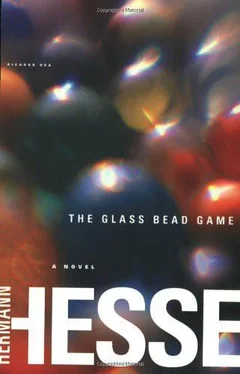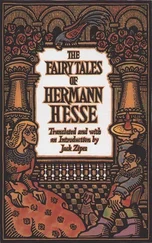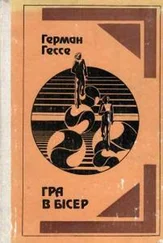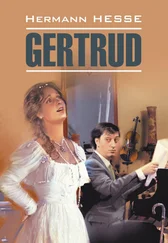Concerning his childhood before he entered the elite schools, we know only a single incident. It is, however, one of symbolic importance, for it signifies the first great call of the realm of Mind to him, the voice of his vocation. And it is characteristic that this first call came not from science or scholarship, but from music. We owe this fragment of biography, as we do almost all the recollections of Knecht’s personal life, to the jottings of a pupil of the Glass Bead Game, a loyal admirer who kept a record of many of the remarks and stories of his great teacher.
Knecht must have been twelve or thirteen years old at the time. For quite a while he had been a scholarship pupil in the Latin school of Berolfingen, a small town on the fringes of the Zaberwald. Probably Berolfingen was also his birthplace. His teachers at the school, and especially his music teacher, had already recommended him two or three times to the highest Board for admission into the elite schools. But Knecht knew nothing about this and had as yet had no encounters with the elite or with any of the masters of the highest Board of Educators. His music teacher, from whom he was learning violin and the lute, told him that the Music Master would shortly be coming to Berolfingen to inspect music instruction at the school. Therefore Joseph must practice like a good boy and not embarrass his teacher.
The news stirred the boy deeply, for of course he knew quite well who the Music Master was. He was not to be compared with the school inspectors who visited twice a year, coming from somewhere in the higher reaches of the Board of Educators. The Music Master was one of the twelve demigods, one of the twelve supreme heads of this most respected of Boards. In all musical affairs he was the supreme authority for the entire country. To think that the Music Master himself, the Magister Musicae in person, would be coming to Berolfingen! There was only one person in the world whom Joseph might have regarded as still more legendary and mysterious: the Master of the Glass Bead Game.
Joseph was filled in advance with an enormous and timorous reverence for the impending visitor. He imagined the Music Master variously as a king, as one of the Twelve Apostles, or as one of the legendary great artists of classical times, a Michael Praetorius or a Claudio Monteverdi, a J. J. Froberger or Johann Sebastian Bach. And he looked forward with a joy as deep as his terror to the appearance of this mighty star. That one of the demigods and archangels, one of the mysterious and almighty regents of the world of thought, was to appear in the flesh here in town and in the Latin school; that he was going to see him, and that the Master might possibly speak to him, examine him, reprimand or praise him, was a kind of miracle and rare prodigy in the skies. Moreover, as the teachers assured him, this was to be the first time in decades that a Magister Musicae in person would be visiting the town and the little Latin school. The boy pictured the forthcoming event in a great variety of ways. Above all he imagined a great public festival and a reception such as he had once experienced when a new mayor had taken office, with brass bands and streets strung with banners; there might even be fireworks. Knecht’s schoolmates also had such fantasies and hopes. His happy excitement was subdued only by the thought that he himself might come too close to this great man, and that his playing and his answers might be so bad that he would end up unbearably disgraced. But this anxiety was sweet as well as tormenting. Secretly, without admitting it to himself, he did not think the whole eagerly anticipated festival with its flags and fireworks nearly so fine, so entrancing, important, and miraculously delightful as the very possibility that he, little Joseph Knecht, would be seeing this man at close quarters, that in fact the Master was paying this visit to Berolfingen just a little on his, Joseph’s, account — for he was after all coming to examine the state of musical instruction, and the music teacher obviously thought it possible that the Master would examine him as well.
But perhaps it would not come to that — alas, it probably would not. After all, it was hardly possible. The Master would have better things to do than to listen to a small boy’s violin playing. He would probably want to see and hear only the older, more advanced pupils.
Such were the boy’s thoughts as he awaited the day. And the day, when it came, began with a disappointment. No music blared in the streets, no flags and garlands hung from the houses. As on every other day, Joseph had to gather up his books and notebooks and go to the ordinary classes. And even in the classroom there was not the slightest sign of decoration or festivity. Everything was ordinary and normal. Class began; the teacher wore his everyday smock; he made no speeches, did not so much as mention the great guest of honor.
But during the second or third hour the guest came nevertheless. There was a knock at the door; the school janitor came in and informed the teacher that Joseph Knecht was to present himself to the music teacher in fifteen minutes. And he had better make sure that his hair was decently combed and his hands and fingernails clean.
Knecht turned pale with fright. He stumbled from the classroom, ran to the dormitory, put down his books, washed and combed his hair. Trembling, he took his violin case and his book of exercises. With a lump in his throat, he made his way to the music rooms in the annex. An excited schoolmate met him on the stairs, pointed to a practice room, and told him: “You’re supposed to wait here till they call you.”
The wait was short, but seemed to him an eternity. No one called him, but a man entered the room. A very old man, it seemed to him at first, not very tall, white-haired, with a fine, clear face and penetrating, light-blue eyes. The gaze of those eyes might have been frightening, but they were serenely cheerful as well as penetrating, neither laughing nor smiling, but filled with a calm, quietly radiant cheerfulness. He shook hands with the boy, nodded, and sat down with deliberation on the stool in front of the old practice piano. “You are Joseph Knecht?” he said. “Your teacher seems content with you. I think he is fond of you. Come, let’s make a little music together.”
Knecht had already taken out his violin. The old man struck the A, and the boy tuned. Then he looked inquiringly, anxiously, at the Music Master.
“What would you like to play?” the Master asked.
The boy could not say a word. He was filled to the brim with awe of the old man. Never had he seen a person like this. Hesitantly, he picked up his exercise book and held it out to the Master.
“No,” the Master said, “I want you to play from memory, and not an exercise but something easy that you know by heart. Perhaps a song you like.”
Knecht was confused, and so enchanted by this face and those eyes that he could not answer. He was deeply ashamed of his confusion, but unable to speak. The Master did not insist. With one finger, he struck the first notes of a melody, and looked questioningly at the boy. Joseph nodded and at once played the melody with pleasure. It was one of the old songs which were often sung in school.
“Once more,” the Master said.
Knecht repeated the melody, and the old man now played a second voice to go with it. Now the old song rang through the small practice room in two parts.
“Once more.”
Knecht played, and the Master played the second part, and a third part also. Now the beautiful old song rang through the room in three parts.
“Once more.” And the Master played three voices along with the melody.
“A lovely song,” the Master said softly. “Play it again, in the alto this time.”
The Master gave him the first note, and Knecht played, the Master accompanying with the other three voices. Again and again the Master said, “Once more,” and each time he sounded merrier. Knecht played the melody in the tenor, each time accompanied by two or three parts. They played the song many times, and with every repetition the song was involuntarily enriched with embellishments and variations. The bare little room resounded festively in the cheerful light of the forenoon.
Читать дальше












